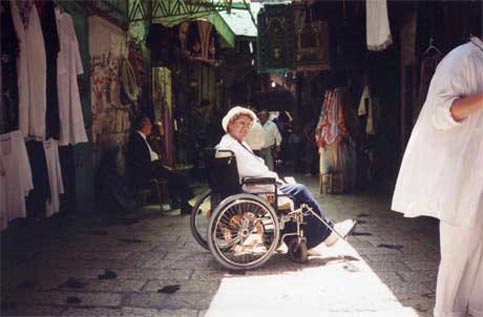Draft law fails to ensure disability rights in Morocco
A draft law on rights for disabled people that has gone before the Moroccan parliament has been criticized by civil society groups. Moroccan disability associations are being supported by Human Rights Watch, which recently wrote to the Moroccan parliament calling on lawmakers to ensure that the draft law accords full rights to disabled people.
The law was originally suggested by the Moroccan minister of women and social development, Bassima Al-Hakaway, who according to “Asharq Al-Awsat”, had proposed it for the first time in 2014. The human rights organisation called on political leaders to amend the law to ensure the full realization of the rights of people with disabilities.
“People with disabilities in Morocco have been treated as objects of charity rather than as equal citizens, leading to stigma and discrimination,” said Eric Goldstein, deputy Middle East and North Africa director at Human Rights Watch.”This draft law gives the government an opportunity to begin to change this perception and make Morocco a regional leader on disability rights, but it needs to be fully grounded in human rights standards.”
Draft law 97.13 on the protection and advancement of persons with disabilities is currently before parliament. It is the first piece of legislation being considered that addresses the rights of people with disabilities since Morocco ratified the international treaty on disability rights in 2009, according to AlAraby AlJadeed.
Human Rights Watch carried out consultations in Morocco with disability rights organisations, people with disabilities and their families and government officials. It concluded that the draft law fails to guarantee the full rights of those with disabilities, including the right to education, and “perpetuates out-dated notions about disability”.
The organisation called for amendments to the law, including “ensuring inclusive education for all children with disabilities in mainstream schools” and “eliminating provisions that would deprive people with disabilities of legal capacity”.
Soumia Amrani, mother of Aya, 22, who is autistic and still lives at home with her parents, said “When Aya was two, she saw her sisters going to school and she wanted to go too, but there was nowhere available for her. I tried to educate her myself, at home with the help of specially trained teachers, but it was very difficult.” In her interview with the Guardian about the situation of the disabled in Morocco taking for example her daughter Aya, Amrani said, “Her life has been ruined because her right to be included has not been recognized.”


























































